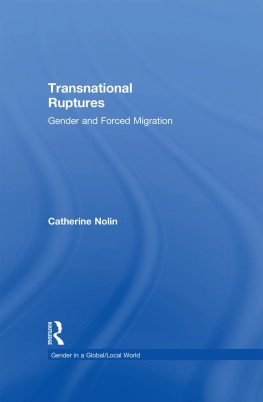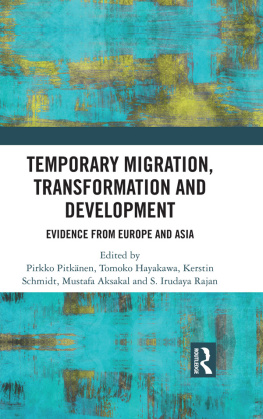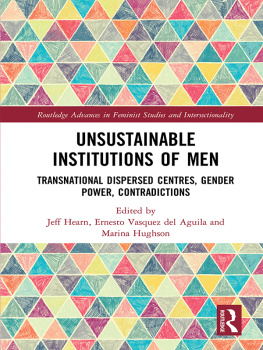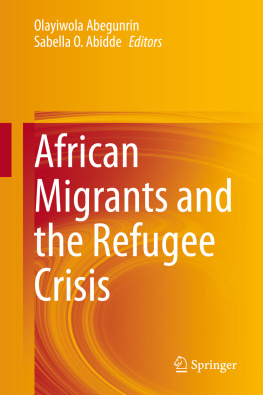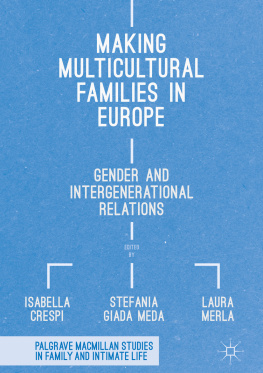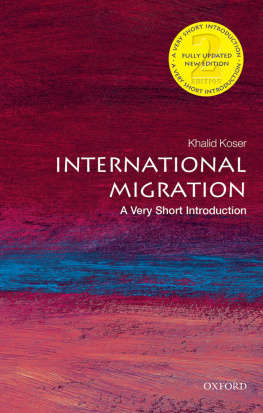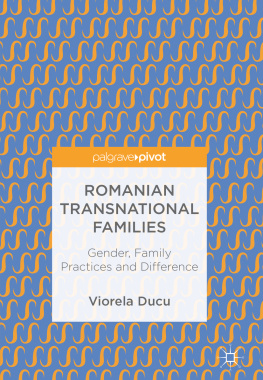TRANSNATIONAL RUPTURES
Gender in a Global/Local World
Series Editors: Jane Parpart, Pauline Gardiner Barber and Marianne H. Marchand
Gender in a Global/Local World critically explores the uneven and often contradictory ways in which global processes and local identities come together. Much has been and is being written about globalization and responses to it but rarely from a critical, historical, gendered perspective. Yet, these processes are profoundly gendered albeit in different ways in particular contexts and times. The changes in social, cultural, economic and political institutions and practices alter the conditions under which women and men make and remake their lives. New spaces have been created economic, political, social and previously silent voices are being heard. North-South dichotomies are being undermined as increasing numbers of people and communities are exposed to international processes through migration, travel, and communication, even as marginalization and poverty intensify for many in all parts of the world. The series features monographs and collections which explore the tensions in a global/local world, and includes contributions from all disciplines in recognition that no single approach can capture these complex processes.
Also in the series
The Gender Question in Globalization
Changing Perspectives and Practices
Edited by Tine Davids and Francien van Driel
ISBN 0 7546 3923 1
Innocent Women and Children
Gender, Norms and the Protection of Civilians
R. Charli Carpenter
ISBN 0 7546 4745 5
Women, Migration and Citizenship
Making Local, National and Transnational Connections
Edited by Evangelia Tastsoglou and Alexandra Dobrowolsky
ISBN 0 7546 4379 4
Turkeys Engagement with Global Womens Human Rights
Nket Kardam
ISBN 0 7546 4168 6
First published 2006 by Ashgate Publishing
Published 2016 by Routledge
2 Park Square, Milton Park, Abingdon, Oxon OX14 4RN
711 Third Avenue, New York, NY 10017, USA
Routledge is an imprint of the Taylor & Francis Group, an informa business
Copyright Catheine Nolin
Catherine Nolin has asserted her right under the Copyright, Designs and Patents Act, 1988, to be identified as the author of this work.
All rights reserved. No part of this book may be reprinted or reproduced or utilised in any form or by any electronic, mechanical, or other means, now known or hereafter invented, including photocopying and recording, or in any information storage or retrieval system, without permission in writing from the publishers.
Notice:
Product or corporate names may be trademarks or registered trademarks, and are used only for identification and explanation without intent to infringe.
British Library Cataloguing in Publication Data
Nolin, Catherine
Transnational ruptures : gender and forced migration.
(Gender in a global/local world)
1. Political refugees - Guatemala 2. Political refugees
Canada 3. Transnationalism 4. Guatemala - History - Civil
War, 1960-1996 - Refugees 5. Guatemala - Emigration and
immigration 6.Canada - Emigration and immigration
I.Title
325.210972810971
Library of Congress Cataloging-in-Publication Data
Nolin, Catherine.
Transnational ruptures : gender and forced migration / by Catherine Nolin.
p. cm. -- (Gender in a global/local world)
Includes bibliographical references and index.
ISBN 0-7546-3805-7 (alk. paper)
1. Forced migration. 2. Women refugees. 3. Refugees--Guatemala. I. Title. II. Series.
HV640.N65 2006
305.906914--dc22
2005032385
ISBN 9780754638056 (hbk)
Contents
For all my family whose love and support see
me through both dark and light moments.
For Neil, Will, and baby-on-the-way all my love.
And for the people of Guatemala within and
beyond their beautiful and brutal country.
Authors Note: Portions of various chapters originally appeared in GeoJournal 56 (2002): 59-67. Reprinted with kind permission of Kluwer Academic Publishers. Portions of . Reprinted with kind permission of the artist Jose Manual Chacn (Filchofo). Cover artwork kindly provided courtesy of the artist Irene Klar.
Transnational Ruptures: Gender and Forced Migration, by Catherine Nolin, is the ninth title to appear in the Ashgate series Gender in a Global/Local World. The series takes advantage of critically engaged new feminist and gender studies scholarship in the turn towards the global. This turn has produced an increased concern with the (gendered) impacts of globalization and contingent international processes. All volumes in this interdisciplinary series pose alternative, gendered questions to mainstream discussion of global processes and local responses.
This volume is no exception. Transnational Ruptures is truly a global/local project. It contributes to a further round of transnational migration scholarship, applying a transnational optic to refugee studies in particular (its theoretical innovation) and to the landscapes of refugees from Guatemala in particular (its methodological contribution). While the refugees in the study reside primarily in Canada, comparisons are drawn with regional migrants living in other contexts, particularly the United States. The comparisons are particularly revealing of how state policies structure transnational experiences, both in contexts of origin for those who remain behind and in the new locations where immigrants reside. Gender, as well as political violence, are shown to be central organizing principles of the refugee immigrant experience.
In demonstrating the relevance of transnationalism to refugee studies, Nolin takes us well beyond the temptation to conflate place with community and community with identity, a not uncommon feature in migration studies. Instead, with a geographers insistence on place making as a social and political process, the author charts a course through the rupturing and suturing of ties, both physical and material, social and personal, experienced by refugees whose migrations commence from political violence. Forced into exile, refugees are often unable to sustain the kinds of transnational connections to their places of origin that the new transnationalism literature describes for many immigrants. For example, remittances, now considered a definitive feature of many transnational migration flows, are less a feature of the transnational connections for the subjects in Nolins study, a finding that directs us back to the harsh realities of racialized labour markets and the persistent income gap experienced by new immigrants. Further, through careful attention to the spatialization of immigrants lives, the insight that refugee social spaces are not necessarily geographic, offers significant challenge to the literature on immigrant communities which can over-read geographic proximity as community. With this insight Nolins work follows on from Women Migration and Citizenship, edited by Tastsoglou and Dobrowolsky, its predecessor in this series, to contribute further detailed examples of the gender differentiated experiences of citizenship, here provided through heart-wrenching accounts of refugee social isolation. Methodologically, Nolins multi-scaled, multi-method, multi-sited, qualitative study, provides a model for interdisciplinary transnational studies, not only of refugees, but other immigrant populations as well. The study has significant implications for researchers and policy makers concerned with the problems and challenges confronting refugees and immigrants in an increasingly unequal yet globally connected world.

